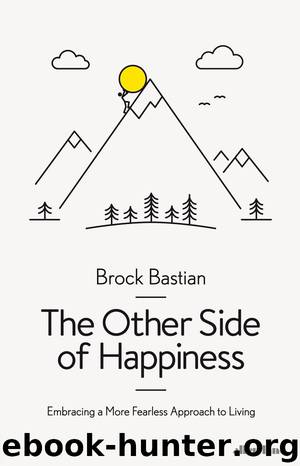The Other Side of Happiness: Embracing a More Fearless Approach to Living by Brock Bastian

Author:Brock Bastian
Language: eng
Format: epub
ISBN: 9780241239858
Publisher: Penguin Books Ltd
Published: 2017-11-24T05:00:00+00:00
STRESS REDUCTION IS NOT ALWAYS THE BEST THERAPY
Biological systems become stronger when exposed to stress. Immunization is a good example (as mentioned in Chapter 2). By exposing the body to controlled doses of a given bacterium we trigger the immune system into building a more effective response. This in turn leads to a stronger immune defence system and a reduced likelihood of infection when future contact with that bacteria occurs. In effect the immune system responds to a moderate level of stress (immunization) by becoming stronger and developing better systems to cope with more significant levels of stress (potential infection) in the future.
When the biological system has not built sufficient defences, and infection takes hold, we are forced to turn to one of the greatest life-saving inventions in human history – antibiotics. But there is a downside; antibiotics strengthen bacteria, not the biological systems they were designed to protect. The more antibiotics we use, the more antibiotic-resistant strains of bacteria we create. Each bacterium that survives a dose of antibiotics adapts and becomes stronger. Furthermore, the more that we rely on antibiotics to kill these bacteria, the more we prevent our immune system from building its own defence systems against infection.20 Indeed, in our attempts to kill bacteria we are creating ‘superbugs’, and have put humanity on the verge of the potential for an outbreak of untreatable disease.
Exposure to stress (such as pain and trauma) can be a catalyst for humans to develop a stronger and more resilient response to future stress; it can literally build ‘psychological immunity’. What is important to consider, however, is that our current approach to psychological therapy is more akin to ‘antibiotics’ than ‘immunization’. Unlike Dienstbier, we have tended to think of arousal as having negative consequences and it is perhaps for this reason that many of our psychological interventions have traditionally aimed at lowering arousal levels – just think of breathing techniques or meditation. This is because we have often considered arousal as an important factor not only in psychological disturbances such as anxiety disorders, but also physical illness. Studies have linked Type-A personality or neuroticism – two personality types defined by a tendency to experience high levels of arousal – to medical conditions such as hypertension or even cancer. On this basis, arousal does not appear to be a very good thing, but the concept of psychological immunization challenges this view.
It is worth briefly considering this link between stress and cancer, and how it might be linked to the differences between prolonged stress and short bursts of stress. Just as prolonged stress can lead to psychological helplessness, as reviewed above, it can also lead to poor immune function and disease – a kind of immune ‘helplessness’ if you like. Yet, as we have seen, short periods of stress can boost adaptive responding by enhancing rather than depleting adrenalin production, which, in turn, can strengthen the immune system and prevent disease. Support for this comes from a study where rats were exposed to intermittent
Download
This site does not store any files on its server. We only index and link to content provided by other sites. Please contact the content providers to delete copyright contents if any and email us, we'll remove relevant links or contents immediately.
The Art of Thinking Clearly by Rolf Dobelli(10489)
Mindhunter: Inside the FBI's Elite Serial Crime Unit by John E. Douglas & Mark Olshaker(9341)
Change Your Questions, Change Your Life by Marilee Adams(7780)
Nudge - Improving Decisions about Health, Wealth, and Happiness by Thaler Sunstein(7706)
Mastermind: How to Think Like Sherlock Holmes by Maria Konnikova(7347)
The Power of Now: A Guide to Spiritual Enlightenment by Eckhart Tolle(5781)
Men In Love by Nancy Friday(5240)
Altered Sensations by David Pantalony(5103)
Factfulness: Ten Reasons We're Wrong About the World – and Why Things Are Better Than You Think by Hans Rosling(4742)
The Confidence Code by Katty Kay(4260)
Thinking in Bets by Annie Duke(4227)
Man and His Symbols by Carl Gustav Jung(4135)
The Worm at the Core by Sheldon Solomon(3487)
Why Buddhism is True by Robert Wright(3452)
Liar's Poker by Michael Lewis(3447)
Three Women by Lisa Taddeo(3433)
The Inner Life of Animals by Peter Wohlleben(3318)
Descartes' Error by Antonio Damasio(3278)
How Music Works by David Byrne(3270)
